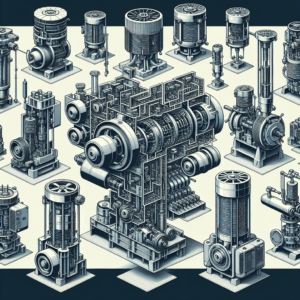Understanding piston compressors
Piston compressors might sound at first, but they’re just clever machines that help us harness air pressure for various tasks. These compressors are mainly used in industries to power tools, inflate tires, and much more. Let’s break down how they work, their advantages, types, and when it’s best to use them.
In the world of industrial machinery, piston compressors stand out as one of the most versatile and widely used technologies. Whether powering pneumatic tools, managing refrigeration systems, or driving large-scale manufacturing processes, these compressors play an essential role in keeping industries running efficiently. But what exactly makes them so indispensable? In this comprehensive guide, “Piston Compressor Technology Explained,” we’ll break down this enduring technology’s mechanics, advantages, and key applications, helping you understand how piston compressors work, why they’re favored across industries, and the latest innovations driving their evolution.
A piston compressor, also known as a reciprocating compressor, is a type of positive displacement compressor. It uses one or more pistons to compress gas or air. The concept is simple yet effective: a piston is placed inside a cylinder and moves in and out, compressing gas with each forward movement. This device is particularly useful for applications requiring high pressure.
How Piston Compressors Work
Piston compressors operate on a fairly straightforward principle. Imagine a bicycle pump – when you push the handle down, you compress the air in the cylinder. The same idea applies here.
- Components: The basic parts of a piston compressor include the cylinder, piston, crankshaft, and valves. The piston moves up and down within the cylinder, compressing air as it moves.
- Air Intake: When the piston moves down, air enters the cylinder through an intake valve, filling the cylinder with air.
- Compression: As the piston moves back up, it compresses the air, increasing its pressure.
- Delivery: The pressurized air then exits through a discharge valve and can be stored in a tank or sent directly to a tool.
Advantages of Piston Compressors
There are several good reasons why many people choose piston compressors.
- Efficiency: Piston compressors can generate high pressure, making them suitable for heavy-duty applications.
- Durability: Often built with robust materials, they tend to last a long time if properly maintained.
- Versatility: They can be used for various tasks, from powering pneumatic tools in a workshop to inflating tires at home.
These benefits make them a popular choice for both professionals and DIY enthusiasts alike.
Types of Piston Compressors
There are two main types of piston compressors, and each serves different needs.
- Single-stage Compressors:
- These are typically smaller, more affordable, and perfect for light tasks like airbrushing, nail guns, or inflating sports equipment.
- The air is compressed in one stroke.
- Two-stage Compressors:
- These are more powerful and suited for industrial applications. They compress air in two stages, allowing for higher pressure levels, which is great for tasks that require more power, such as spray painting or running larger pneumatic tools.
When to Use Piston Compressors
Understanding when to use a piston compressor can make your tasks easier and more efficient.
- Home Projects: If you’re planning to do some home improvement, a smaller single-stage compressor could be just what you need for quick jobs.
- Industrial Use: In a workshop or factory, a two-stage compressor is often necessary for demanding operations that require constant and powerful air supply.
Reflecting on my personal experience, I remember using a small single-stage compressor for painting a piece of furniture. It was light and easy to maneuver, and it provided just the right amount of pressure for a smooth finish. It’s moments like these that make you appreciate how handy a piston compressor can be!
Piston compressors are widely used in industrial machinery due to their versatility. They are used to power pneumatic tools, manage refrigeration systems, and drive large-scale manufacturing processes. In this comprehensive guide, “Piston Compressor Technology Explained,” we will discuss these compressors’ mechanics, advantages, and key applications. This guide aims to help you understand how piston compressors work, why they are favored across industries, and the latest innovations driving their evolution.
Conclusion
Piston compressors are a versatile, efficient, and durable addition to anyone’s toolkit, whether at home or in an industry. By understanding their operation, advantages, types, and best uses, you can make informed decisions and perhaps enjoy your projects even more. So, whether you’re tackling a DIY task or working in a professional setting, consider the straightforward yet effective piston compressor to meet your air needs.

